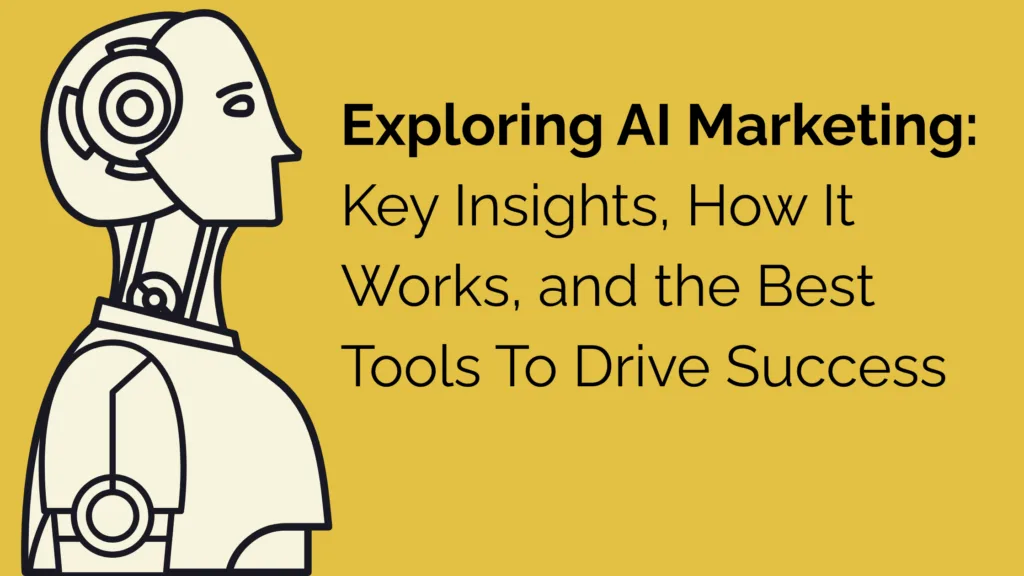
This blog is a tech content sample
In only the last few years, Artificial Intelligence has moved from the realm of science fiction to changing and sometimes revolutionizing virtually every industry. The advent of AI means that Marketing will never again look the same, as brands suddenly have new and innovative ways to interact with their customers.
However, despite the numerous AI-related headlines cluttering everyone’s feeds, there are many misconceptions about what AI can do. This means that many businesses are limiting themselves when implementing artificial intelligence marketing, particularly when it comes to expanding into global markets.
This guide will walk you through how to use artificial intelligence in marketing and provide your brand with an understanding of how to expand its customer base by leveraging AI in marketing.
What Is AI in Marketing?
The public conversation around AI gained momentum at the end of 2022, when OpenAI first released a demo of ChatGPT. While generative AI, which can produce text, images, or video, has dominated public interest, this isn’t the only form of AI in marketing. Digital marketing and artificial intelligence are made for each other. Forms of AI in marketing have actually been in use for decades, with the Apriori algorithm, which identifies relationships between items, proposed in 1994 and still in use today.
IBM defines AI marketing as “using AI capabilities like data collection, data-driven analysis, natural language processing (NLP) and machine learning (ML) to deliver customer insights and automate critical marketing decisions.”
To break down that definition, here are the four main examples of artificial intelligence used in marketing:
- Predictive artificial intelligence combines traditional statistical analysis with machine learning to use data to predict upcoming events. While predictive analytics isn’t new, AI can incorporate previously unheard-of amounts of data to make even more accurate predictions.
- Natural language processing (NLP) uses a variety of techniques to transform human language into a set of rules and statistics that the computer can understand.
- Machine learning is a three-step process where AI assesses data to make a hypothesis, compares it to external examples to see how well it performed, and then adjusts its methods to get a better result.
- Deep learning is a form of machine learning where an AI attempts to replicate the incredible number of processes in a human mind by using a neural network.
Using AI in Marketing: 3 Ways To Integrate It Into Your Marketing Strategy
Now you know a little more about the types of artificial intelligence, let’s see concrete examples of how brands are using ai in marketing, especially when it comes to international business.
1. Expand your content’s reach
Using generative AI for content creation is one of its most popular use cases in the realm of marketing. There has been some pushback over using it for actually writing or illustrating content. However, there are other use cases beyond generative AI.
Brands can utilize predictive analysis when selecting topics for content and recommending content to users. AI can efficiently analyze massive amounts of user data to pinpoint the content that’s the most useful to your audience.
This is especially useful when creating content for an international audience that may have different interests or concerns. For example, content related to “The New Year” would be most relevant at different times, depending on the market you’re targeting.
Spotify and Netflix both use predictive AI to determine what content will resonate with users. Spotify’s AI studies regional trends to recommend music and podcasts to users based on their location. Netflix’s AI predicts the type of content that will be popular in different markets, guiding their investment choices in specific shows.
2. Personalize your outreach
In a perfect world, every business would have enough time, money, and staff to customize marketing materials to each individual, especially since 71% of consumers expect some level of personalization in marketing. That’s where AI can help.
Traditional segmentation has typically used only a few easily definable variables, such as demographics, to categorize customers. AI, on the other hand, can synthesize many factors, including customer behavior, to craft very nuanced profiles.
For example, Amazon utilizes machine learning to create highly targeted segments based on browsing and purchasing history, location, and local culture.
In email marketing, the most common form of personalized outreach is inserting the customer’s name. With AI, you can do far more, including generating dynamic content and automating customer segmentation.
On the international front, you can use AI to adapt to the customers’ local holidays, customs, and design preferences. Apparel companies, for example, can use AI to suggest clothing that is relevant to the season and weather that the user is experiencing, while incorporating design preferences from the region.
3. Enhance your customer service
Natural Language Processing and Machine Learning have advanced the traditional chatbot with its canned responses to Virtual Customer Assistants (VCAs). These enable a far more natural interaction and can even perform tasks for customers in some cases, such as transferring money or trading stocks.
Delta Air Lines uses its advanced chatbot to help international customers check in, track their bags, and find their flights. It’s been so effective that their call center volume dropped 20%, showing that AI marketing does actually work.
Outside of direct interaction, AI can also help customers access the help they need faster through machine learning. Machine learning can utilize data about past behavior and results to expedite the process of connecting a client with the right representative.
DevRev uses machine learning to automate ticket classification, routing, and prioritization, which has significantly improved customer support.
Implement AI Marketing and Achieve Global Success With Company X
We’re still seeing how artificial intelligence will change the future of marketing. The potential uses for AI in marketing are frankly endless, and as AI continues to improve, there will be even more use cases and tools. Companies that are able to develop strategic and evolving approaches to AI marketing will have a significant advantage when connecting with the global market.
Clear communication and excellent translations are key to connecting an international audience, as 72% of customers prefer to interact in their native tongue. This is where Company X’s solutions come into play, as we provide human-quality translation and Machine Translation Post-Editing (MTPE) services at half the price and twice the speed of traditional methods. We help ensure that your marketing maintains its impact and authenticity regardless of language or cultural barriers.
Contact us to discover how we can help you connect with your customers.
